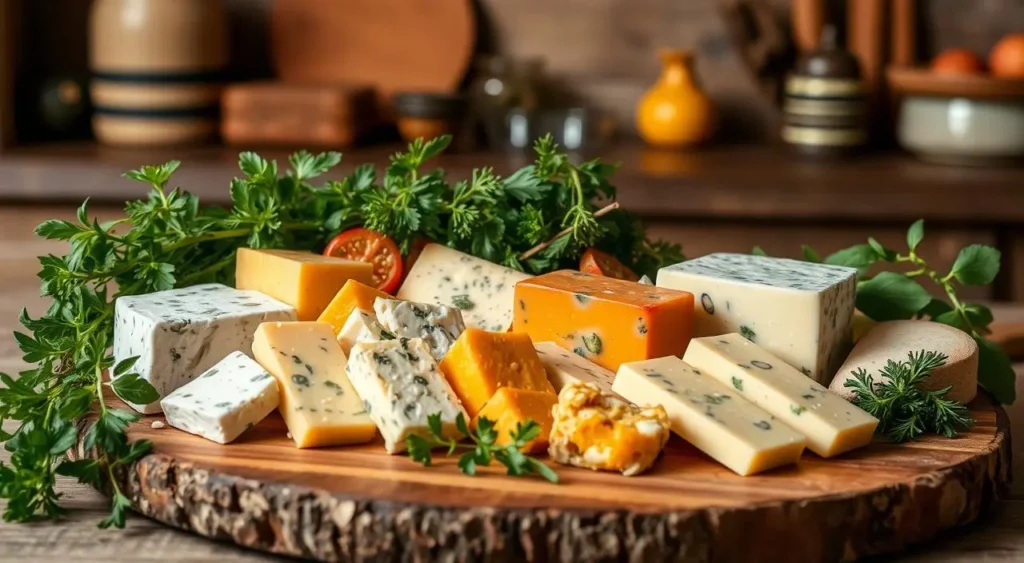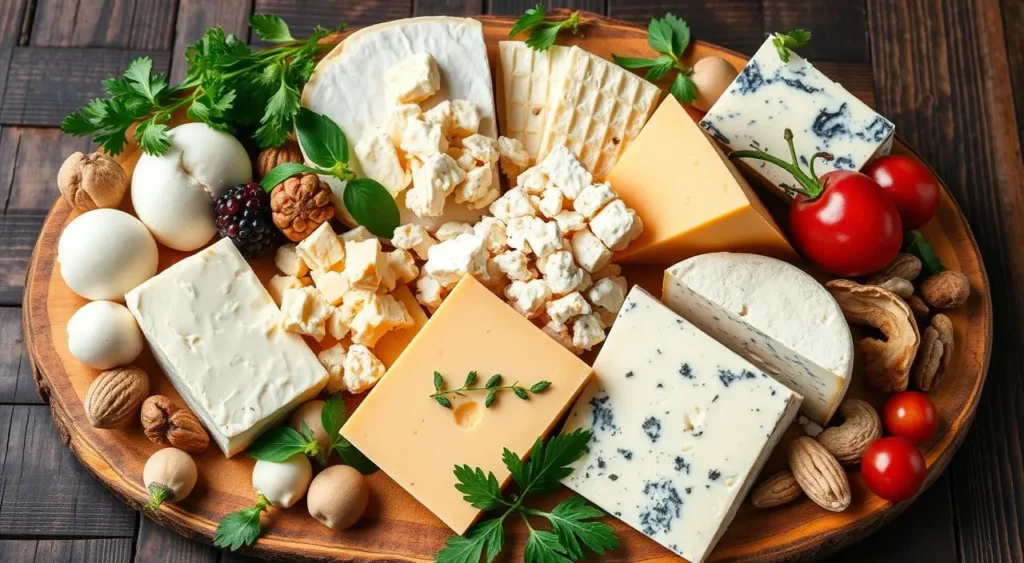What Cheese is Vegetarian? A Complete Guide to Smart Choices. Did you know that over 40 million Americans are vegetarian or vegan? This rising trend has created a huge demand for vegetarian-friendly cheese. But how do you know what cheese is truly vegetarian? This guide dives into the world of vegetarian cheese, exploring the key differences, popular options, and tips to help you make the best choices.
Key Takeaways
- Vegetarian-cheese is made without animal-derived rennet, a key ingredient in traditional cheesemaking.
- Soft and hard cheeses can be vegetarian-friendly, depending on the type of rennet used.
- Many popular brands and artisanal producers offer a range of vegetarian-cheese options.
- Reading labels carefully is crucial to identifying vegetarian-cheese in stores.
- Homemade vegetarian-cheese is a delicious and rewarding option for those seeking more control over their ingredients.
Understanding Vegetarian Cheese Basics
If you’re a vegetarian or just want to eat more mindfully, knowing about rennet is key. Rennet is an enzyme that makes milk turn into cheese. It’s important for making cheese, but not all types are okay for vegetarians.
The Role of Rennet in Cheese Making
Rennet is essential in turning milk into cheese. It breaks down milk proteins, creating curds and whey. The type of rennet used affects the cheese’s texture and taste.
Animal vs. Vegetable Rennet: Key Differences
Traditionally, rennet comes from young animals like calves and lambs. This animal rennet gives cheese its unique taste and texture. But, for those who don’t eat animal products, vegetable rennet is a good choice. It’s made from plants like thistle and artichoke, offering similar cheese qualities.
Why Some Cheese Isn’t Vegetarian
Not all cheese is vegetarian. Cheeses made with animal rennet aren’t for vegetarians. Some cheeses also have animal fats or gelatin, making them not vegetarian.

Common Types of Vegetarian-Friendly Cheese
There are many vegetarian cheese options for different tastes. You can find soft, creamy cheeses or hard, crumbly ones. Let’s look at some common vegetarian cheeses you can use in your cooking.
Soft Vegetarian-Cheeses
Ricotta, cottage, and cream cheese are favorites for vegetarians. They’re made with plant-based rennet, so they’re animal-free. These cheeses are soft and mild, great for many dishes, from savory to sweet.
Hard Vegetarian-Cheeses
If you like strong cheese, try hard vegetarian cheeses. Cheddar, Parmesan, and Gruyère are good choices. They’re made with plant-based rennet and have a rich flavor. They’re perfect for mac and cheese or pizza.
Artisanal Vegetarian-Cheese Options
The market also has artisanal and specialty vegetarian cheese options. These cheeses come from small producers and have unique flavors and textures. You can find creamy brie-style cheeses or tangy blue-veined ones.
The vegetarian cheese market has a wide range of cheeses. Whether you prefer soft, hard, or artisanal cheeses, there’s something for everyone. Explore and enjoy the variety of vegetarian cheeses available.
What Cheese Is Vegetarian: Comprehensive List
Exploring vegetarian cheese is a fun journey with many options. You can find soft, creamy cheeses or firm, flavorful ones. This guide will show you the wide range of vegetarian cheeses, from soft to hard.
Soft Vegetarian-Cheeses
Soft vegetarian-cheeses are full of creamy goodness. They have a velvety texture and various flavors. Some favorites include:
- Brie
- Camembert
- Goat cheese
- Ricotta
- Mozzarella
Hard Vegetarian-Cheeses
If you prefer firmer cheeses, there are many great options. These cheeses have complex flavors and textures. Some top picks are:
- Cheddar
- Parmesan
- Gruyère
- Manchego
- Provolone

Plant-Based Cheese Alternatives
For those who want dairy-free choices, there are many plant-based cheeses. These cheeses taste and feel like traditional cheese but are plant-based. Some favorites are:
| Cheese Alternative | Key Ingredient | Texture |
|---|---|---|
| Cashew-based cheese | Cashews | Soft and creamy |
| Almond-based cheese | Almonds | Firm and sliceable |
| Coconut-based cheese | Coconut | Soft and spreadable |
Whether you’re into vegetarian cheese or plant-based options, this list is a great start. Explore the many flavors and textures in the vegetarian cheese world.
How to Identify Vegetarian Cheese in Stores
Finding vegetarian cheese in the dairy aisle can be tricky. But, with a few tips, you can easily spot vegetarian cheese. This way, you can make choices that fit your diet.
Reading labels is key to finding vegetarian cheese. Look for “vegetarian” or “made with vegetable rennet” on the label. This means the cheese doesn’t have animal-derived rennet, which is important for vegetarians.
- Scan the ingredient list for terms like “microbial rennet” or “plant-based rennet.” These are common in vegetarian cheese.
- Check for certifications or seals from trusted organizations, like the Vegetarian Society or the American Vegetarian Association. These can confirm the cheese is vegetarian.
Not all cheese labels clearly say they’re vegetarian. If you’re unsure, contact the manufacturer or check their website. Many companies now share details about their cheese-making process and ingredients.
| Indicator | Meaning |
|---|---|
| “Vegetarian” | Cheese is made without animal-derived rennet. |
| “Microbial rennet” or “plant-based rennet” | Cheese is made with non-animal sources of rennet. |
| Certifications (e.g., Vegetarian Society, American Vegetarian Association) | Cheese has been verified as vegetarian by a trusted organization. |
Remember these tips to find vegetarian cheese labels easily. This way, you can confidently choose vegetarian cheese at the store.
Popular Brands Making Vegetarian Cheese
More brands are now making vegetarian cheese, offering tasty and eco-friendly choices. This includes American and European companies, as well as small, artisanal makers. Together, they’re making it easier for people to find great vegetarian cheese.
American Manufacturers
In the US, big names like Daiya, Follow Your Heart, and Treeline Cheese are leading the way. They make plant-based cheeses that are perfect for vegetarians and vegans. Their cheeses melt well and taste great, thanks to ingredients like cashews and soy.
European Producers
In Europe, brands like Violife, Alpro, and Miyoko’s Creamery are famous for their vegetarian cheeses. They mix old cheesemaking ways with new plant-based ingredients. This creates a wide range of cheeses that everyone loves.
Artisanal Cheese Makers
There’s also a growing group of small, artisanal cheese makers. They’re passionate about making sustainable, ethical cheese. They offer everything from nut-based cheeses to cashew spreads, pushing the limits of vegetarian cheese.
Looking for classic tastes or something new? The world of vegetarian cheese has it all. By choosing these brands, you help support sustainable food and enjoy tasty, ethical cheese.

Reading Labels: Understanding Cheese Ingredients
Exploring cheese can be tricky, especially when reading labels. Whether you’re a vegetarian or just want to make better choices, knowing what’s in cheese is key. Let’s look at how to spot vegetarian cheese ingredients and choose the best for your diet.
Identifying Vegetarian-Friendly Cheese
The main sign of vegetarian cheese is the type of rennet used. Traditional rennet comes from calf stomachs, not good for vegetarians. But, many cheeses now use vegetable rennet or microbial rennet, which come from plants.
When checking cheese label ingredients, look for “vegetable rennet,” “microbial rennet,” or “animal-free rennet.” These words mean the cheese is okay for vegetarians.
| Vegetarian Cheese Ingredients | Non-Vegetarian Cheese Ingredients |
|---|---|
| Vegetable rennet Microbial rennet Enzyme rennet Plant-based coagulants | Animal rennet Animal-derived enzymes Casein Whey |
Some cheeses, even with vegetable rennet, might have animal products like enzymes or casein. Always check the whole list of cheese label ingredients to make sure it fits your diet.
Knowing what to look for in vegetarian cheese helps you make better choices. You can enjoy a variety of tasty and healthy cheese options.
Making Vegetarian Cheese at Home
If you love making homemade vegetarian cheese, you’re in for a treat. Making your own dairy-free cheese is a fun and rewarding hobby. With the right tools and techniques, you can make delicious, plant-based cheese that’s just as good as store-bought.
Essential Equipment
To start, you’ll need some basic equipment. You’ll need a strong pot, cheesecloth, a colander, and a cheese mold. A thermometer is also helpful for keeping the right temperature.
Basic Techniques
The main steps in making homemade vegetarian cheese are coagulating the milk, separating the curds, and pressing the cheese. These steps are the same for most vegetarian cheese recipes.
Popular Recipes
- Cashew-based cheese: Soaking cashews and blending them with herbs and lemon juice makes a creamy cheese.
- Almond-based cheese: Like cashew cheese, almond cheese has a nutty taste and is great for many dishes.
- Tofu-based cheese: Firm tofu can be turned into many types of cheese, from feta to ricotta.
Choosing any vegetarian cheese recipes lets you play with flavors and textures. It’s all about making cheese that you love.
“Making your own vegetarian cheese at home allows you to control the quality and ingredients, ensuring a healthier, more ethical alternative to store-bought options.”
International Vegetarian Cheese Options
The global vegetarian cheese market is filled with unique flavors from around the world. From India’s creamy paneer to Cyprus’s tangy halloumi, there’s a wide range of global vegetarian cheese to try. Each cheese reflects the rich culinary traditions of its country.
Discover the vibrant world of international cheese varieties made for vegetarians:
- Paneer (India): A soft, fresh cheese without rennet, great in curries and savory dishes.
- Halloumi (Cyprus): A semi-hard, brined cheese perfect for grilling or frying.
- Queso Fresco (Latin America): A mild, crumbly white cheese for tacos, salads, and more.
- Mozzarella di Bufala (Italy): A creamy, soft cheese from water buffalo milk, loved in pizza and caprese salad.
- Tofu (East Asia): A versatile, soybean-based “cheese” used in many Asian dishes and as a substitute.
These cheeses are just a few examples of the many international cheese varieties available. Exploring these options can open up new culinary adventures and introduce you to exciting cheese experiences.
“Cheese is like music. There’s a lot of complexity and nuance, and you can learn more about it every day.” – Jasper Hill, Cheese Maker
Nutritional Benefits of Vegetarian Cheese
Vegetarian cheese has many nutritional benefits. It is rich in high-quality protein, vitamins, and minerals. This makes it a great choice for those who care about their health.
Protein Content
Vegetarian cheese is a good source of plant-based protein. Cheeses made from soy or almond can have as much protein as dairy cheese. This is good for those who want to eat more protein.
Calcium and Vitamins
Vegetarian cheese is also packed with calcium and vitamins. Many are fortified with calcium. This means they can give you the calcium you need every day, just like dairy cheese.
Comparison with Non-Vegetarian Cheese
- Vegetarian cheese has less saturated fat and cholesterol than dairy cheese. This makes it better for your heart.
- Some vegetarian cheeses are lactose-free. This is good for people with lactose intolerance or sensitivity.
- Some vegetarian cheeses have as much protein as non-vegetarian cheese. This is a big plus for protein lovers.
Overall, vegetarian cheese is a great choice for those who want a plant-based, sustainable, and healthy cheese option.
Common Myths About Vegetarian Cheese
There are many myths about vegetarian cheese that need clearing up. We’ll tackle some of the biggest cheese myths and give you the facts. This way, you can make better choices.
One big myth is that vegetarian cheese tastes bad or feels different. But, this is not true. New cheese-making methods have created many tasty vegetarian cheese options. They’re just as good as cheese made from animals.
- Many vegetarian cheese types, like cheddar, Parmesan, and mozzarella, taste just like the non-vegetarian kinds.
- New plant-based helpers, like microbial rennet and agar-agar, let cheesemakers make vegetarian cheese that melts and stretches like traditional cheese.
Another myth is that vegetarian cheese is less healthy than cheese made from animals. But, this isn’t always true. Many vegetarian cheese kinds are full of protein, calcium, and other good stuff. They can be just as nutritious as cheese made from animals.
| Nutrient | Vegetarian Cheddar Cheese | Non-Vegetarian Cheddar Cheese |
|---|---|---|
| Protein (g per 100g) | 24.9 | 25.1 |
| Calcium (mg per 100g) | 721 | 718 |
| Vitamin B12 (μg per 100g) | 1.8 | 2.4 |
Learning about vegetarian cheese opens up a world of tasty and healthy choices. Explore the many options available!
“The rise of high-quality vegetarian cheese has been a game-changer. It lets people with dietary needs enjoy cheese without giving up their values.”
Best Ways to Store and Serve Vegetarian Cheese
Proper storage and serving of vegetarian cheese can greatly enhance its taste and freshness. Here are some essential tips to keep in mind.
Storage Tips
Wrap your cheese in wax paper or parchment and store it in the fridge. This keeps it moist and prevents drying. For harder cheeses, use an airtight container.
Don’t store cheese in plastic. It can hold too much moisture and cause mold.
Serving Suggestions
Let the cheese warm up to room temperature before you eat it. This brings out its flavor and creaminess. Serve it on a wooden board or slate with crackers, bread, and fruit or nuts.
Pairing Guidelines
Vegetarian cheese pairs well with many things. Soft cheeses are great with apple slices, fig jam, or walnuts. Harder cheeses go well with dried fruits, olives, and red wines.
Try different pairings to find your favorite.
FAQ
What cheese has no animal rennet?
Many cheeses are made without animal rennet for vegetarians. Soft cheeses like brie and ricotta are good examples. Hard cheeses like cheddar and parmesan also fit the bill.
These cheeses use vegetable or microbial rennet instead. This makes them safe for vegetarians to eat.
How can I identify vegetarian cheese?
Look for “vegetarian” or “no animal rennet” on the label. Check the ingredients for vegetable or microbial rennet. This shows it’s made without animal products.
Also, organic and artisanal cheeses are often vegetarian. They highlight this in their marketing.
What are some popular brands of vegetarian cheese?
Brands like Violife and Treeline offer a variety of vegetarian cheeses. Follow Your Heart, Miyoko’s, and Daiya also have great options. They focus on plant-based and dairy-free cheeses.
Even big names like Cabot, Whole Foods, and Trader Joe’s have vegetarian cheese now. They’ve added these options to their lines.

